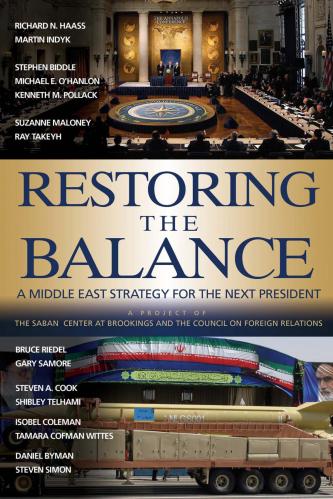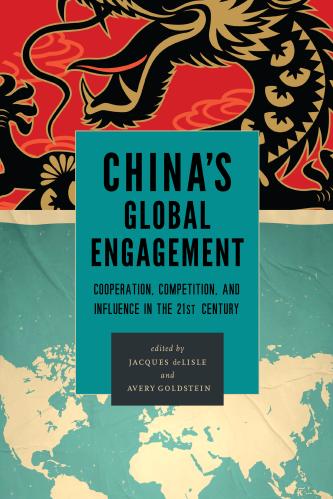 In May 2020, U.S. Secretary of State Mike Pompeo made an extraordinary visit to Israel. The first foreign official to visit since the COVID-19 pandemic swept both countries, he did so amid severe restrictions on travel to Israel. The trip dealt with an issue of top priority for U.S. policymakers: Chinese investment in Israeli infrastructure. Pompeo reportedly came to pressure Prime Minister Benjamin Netanyahu and his cabinet to reject a Chinese bid to run Israel’s largest desalination plant.1 The pressure worked, and it was not nearly the first time the U.S. had intervened in a major economic interest in Israel for fear of Chinese advancements. The case was but one instance of a far broader phenomenon — one that is likely to grow in importance.
In May 2020, U.S. Secretary of State Mike Pompeo made an extraordinary visit to Israel. The first foreign official to visit since the COVID-19 pandemic swept both countries, he did so amid severe restrictions on travel to Israel. The trip dealt with an issue of top priority for U.S. policymakers: Chinese investment in Israeli infrastructure. Pompeo reportedly came to pressure Prime Minister Benjamin Netanyahu and his cabinet to reject a Chinese bid to run Israel’s largest desalination plant.1 The pressure worked, and it was not nearly the first time the U.S. had intervened in a major economic interest in Israel for fear of Chinese advancements. The case was but one instance of a far broader phenomenon — one that is likely to grow in importance.
Great power competition between the United States and China, should it arise in full force, would change the face of Middle Eastern affairs. Countries in the region would face a new geopolitical and economic calculus, with new pressures placed on the way many of them conduct their national security. Israel is an illustrative example of this — already torn between economic and diplomatic interests to cooperate with China and consistent, notably bipartisan pressure from the United States to limit such cooperation. This type of balancing act may become far more important in years and decades to come, moving to center stage in the national security calculations of Israel and other countries in the region.
U.S. concerns regarding Chinese investment in Israel extend to issues beyond the desalination plant. Chinese firms are deeply involved in the future management of the major port in Haifa where the U.S. Navy’s Sixth Fleet regularly docks, raising strident objections from American officials.2 Washington is also wary of Chinese involvement in the future of 5G telecommunications in Israel, as in many countries in the world.3 In an attempt to assuage American concerns, Israel has set up a board to evaluate foreign investments, and its list of concerns issues seems destined to grow ever longer as Israeli commercial interests intertwine with the country’s critical infrastructure and large security industry.
Earlier cases of the United States vetoing Israeli-Chinese arms deals make the point clearer still. In 1999, Israel and China signed a deal for the sale of three Israeli Phalcon early warning aircraft to China. Strenuous U.S. objection lead to the cancelling of the deal even after a Chinese advance had been paid.4 Needless to say, the case caused a great deal of strain in Israeli-Chinese relations. In 2004, China sent Israeli-made Harpy unmanned aerial vehicles (UAVs) for upgrades in Israel. The United States demanded that the UAVs — already Chinese state property — be confiscated. Israel eventually returned the aircraft to China without repair, causing both serious stress between Israel and the United States, and a second crisis between Israel and China.5
China’s growing regional influence
China’s presence in the Middle East has broadened and deepened over the last decade. Beijing’s importance to the region will likely continue to rise, with commercial and investment ties to the region growing within the rubric of China’s far broader Belt and Road Initiative (BRI).6 For Beijing, an overriding need for energy imports underlies its interest in the region. With its high volumes of energy imports, China is the largest trading partner of many countries in the Middle East. It is, further, an enormous investor in construction and infrastructure, primarily through BRI.7 The burgeoning economic activity has been accompanied by a burst of Chinese diplomacy in the Middle East. Beijing has signed partnership agreements of various kinds with 13 of the region’s countries during the last decade.8
Source: World Bank9
Still, despite its increasing centrality to the region’s economic affairs and its intensifying diplomatic presence, Beijing hesitates to involve itself in regional security issues. In policy documents outlining its approach to the region, including the 2015 “Visions and Actions on Jointly Building Silk Road Economic Belt and 21st Century Maritime Silk Road” and the 2016 “Arab Policy Paper,” references to regional diplomatic and economic initiatives are central, while security issues are given far less prominence.10
In keeping with this focus on economic rather than security ties, China remains largely on the sidelines of the Middle East’s core geopolitical fault lines. Beijing has, for example, maintained positive relationships on both sides of the Iranian-Saudi rivalry.11 The same is true of the Israeli-Palestinian conflict, and is broadly consistent with China’s approach to the dispute between members of the Gulf Cooperation Council. China has, in other words, managed to involve itself economically and diplomatically with almost all parties in the region while shouldering none of the security burdens and embarking on none of the security misadventures that have characterized U.S. involvement in the region.
China’s limited naval capacity in the region has grown, though modestly. It maintains an increasing presence in the Red Sea, notably in Djibouti, where it established a military base and has invested heavily in port facilities.12 While Beijing remains several steps away from becoming a central naval power in the region, its immense energy interests provide Chinese leaders a potential incentive to build their regional naval capacity for a future possibility in which they feel their energy interests are not sufficiently secured. Even if Beijing does not now intend to take on such a role, potential American retrenchment in the region could change its calculations in the long term. For Israel and other close partners of the United States, this prospect raises the specter of an external power influencing regional security affairs and far less attune to Israel’s core interests than the United States. For now, though, “China is happy to have the United States incur the costs in the region while China derives the benefits.”13
Despite — or perhaps because of — its relatively light security footprint, China holds several advantages over the Unites States in developing regional relationships. Through strategic partnerships usually founded in economic interests, China has pursued its Middle Eastern interests on a bilateral basis, generally without adopting region-wide or multilateral goals. Beijing has avoided an American-style approach that attempts — or purports — to build from a region-wide political strategy such as democratization or containing Iran. This allows it greater flexibility than the United States in its dealings with individual Middle Eastern countries. Moreover, and unlike the United States, it does not ask its partners for government reform, promote democratization, or otherwise intervene in other countries’ domestic affairs.14 For many of the region’s governments, used to dealing with American administrations concerned with their domestic governance, Beijing’s silence on such issues makes it an attractive partner.
The avoidance of domestic political issues — especially those relating to human rights — goes both ways in discussions between China and many of its Middle Eastern partners. Most notably, Muslim-majority countries in the region like Egypt, Saudi Arabia, and the United Arab Emirates have declined to criticize China’s mass repression of its Uighur Muslim minority in Xinjiang province.15 This creates a comfortable relationship among non-democracies, each refraining from criticizing the other, often leaving the United States as the odd man out.
Meanwhile, for many in the United States, the Middle East seems like yesterday’s problem. The American public and many policymakers consistently express weariness of Middle Eastern affairs and a wariness of U.S. involvement in them, especially in military conflict.16 There is danger in taking this line of thinking too far — the United States is still heavily involved in the region and most Americans do not express a desire to simply cut all ties — but the trend is clear.
In contrast to the Middle East, Washington’s focus on a new global competition with China has increased in recent years, at times quite dramatically. The Trump administration’s trade war with China and the war of words over China’s handling of the COVID-19 pandemic contribute to this widespread perception, but they are only part of the story. Several influential Democratic policy voices have also turned their attention toward the likelihood of some form of extended U.S.-China global competition, and quite a few of them are hawkish on China.17 There is a significant possibility of future raised tensions between the two countries regardless of the party in power in the United States.
Regional countries’ choices amid future competition
The United States and China share an interest in the continued, secure flow of energy from the region. China’s interest in Middle Eastern energy has surpassed that of the United States, with American production capacity — at least at high enough prices — providing for net independence in energy, while China remains reliant on imports. Getting muddled in difficult regional problems would be highly undesirable for Beijing, and would mark a significant departure from its current approach to the region. That said, the continued erosion of U.S. willingness to patrol the Middle East may force China to reconsider this reluctance. China’s interest in Middle Eastern energy supplies may be such that future changes to the geopolitical situation in the region could necessitate a departure from its current stance.
As China’s global prominence and its nascent military presence in the region grow, it may find itself under greater pressure to choose sides in regional disputes. This could provoke a broader realignment of regional geopolitics, especially if Beijing and Washington back opposing blocs in a new contest for influence in the region.
For the United States, China’s interest in the Middle East may actually prove an impetus for staying there. If China’s regional role does increase amid rising U.S.-Chinese rivalry, the defining regional question for American policymakers may be how to balance their own wariness of Middle Eastern affairs with a desire to contain China’s influence.
[D]espite their respective desires to stay out, their rivalry could draw both the United States and China to greater involvement in Middle Eastern affairs than either would otherwise choose…
In other words, despite their respective desires to stay out, their rivalry could draw both the United States and China to greater involvement in Middle Eastern affairs than either would otherwise choose, with each increasing their investments and commitments to counter the other’s regional influence. Given both the American and Chinese government’s present hesitance to wade into complex regional disputes, it seems more likely that global competition would provoke regional competition, instead of the reverse. For both, Middle Eastern security issues may be a geopolitical arena of last resort, but in a broader competition the two countries could seek opportunities wherever they can be found.
If U.S.-Chinese competition leads the two countries to greater involvement in Middle Eastern security affairs, such a contest would place significant pressures on the countries of the region, especially those which have traditionally partnered with the United States. Israel would likely find itself facing a heightened version of the ongoing, difficult task of managing relations with the United States while seeking to pursue opportunities with China, especially in infrastructure and technology transfers.18
A choice between the United States and China would be costly for Israel — Chinese economic opportunities are large and growing. Yet for Israel, more than for other regional actors, the choice is clear. From Israel’s perspective, Beijing’s continuing interest in maintaining the secure flow of energy from the region, mean that its primary interests lie with parties other than Israel, notably Saudi Arabia and Iran.19 In extremis, this could prove a major challenge to Israeli national security in a future where China is more engaged in regional affairs and regional dynamics have shifted to Israel’s detriment.
American policymakers and experts from across much of the political spectrum are expecting that allies around the world may have to make stark and difficult choices in the future between the two powers. Israel must therefore play a difficult balancing act: continue to work to broaden its international cooperation, including with China, while recognizing the seriousness of U.S. concerns and the real and costly limitations these concerns place on Israeli-Chinese cooperation. For Israel, the bottom line in its relations with China is clear: Beijing cannot replace Washington.
-
Footnotes
- Itamar Eichner, “China loses bid to run Israel’s biggest desalination plant after U.S. pressure,” Ynet, May 26, 2020, https://www.ynetnews.com/article/HkBaQNco8.
- Rom Kampeas, “US Senate warns Israel against letting China run Haifa port,” The Times of Israel, June 14, 2019, https://www.timesofisrael.com/us-senate-warns-israel-against-letting-china-run-haifa-port/.
- Noa Landau and Tucker, “U.S. Ambassador Calls on Israel to Block Chinese Moves Into 5G Network Market,” Haaretz, May 26, 2020, https://www.haaretz.com/israel-news/.premium-u-s-ambassador-calls-on-israel-to-block-chinese-moves-into-5g-network-market-1.8874910.
- Lior Kodner, “China Irked at U.S. Interference in Phalcon Deal,” Haaretz, June 8, 2005, https://www.haaretz.com/1.4929020.
- Conal Urquhart, “US acts over Israeli arms sales to China,” The Guardian, June 12, 2005, https://www.theguardian.com/world/2005/jun/13/usa.israel.
- For background regarding the BRI, see Nadège Rolland, “A Concise Guide to the Belt and Road Initiative,” The National Bureau of Asian Research, April 11, 2019, https://www.nbr.org/publication/a-guide-to-the-belt-and-road-initiative/.
- For an overview on Chinese investments in North Africa, see Adel Abdel Ghafar and Anna L. Jacobs, “China in the Mediterranean: Implications of expanding Sino-North Africa relations,” (Washington, DC: The Brookings Institution, July 2019), https://www.brookings.edu/research/china-in-the-mediterranean-implications-of-expanding-sino-north-africa-relations/.
- Jonathan Fulton, “China’s changing role in the Middle East,” (Washington, DC: The Atlantic Council, June 5, 2019), 4, https://www.atlanticcouncil.org/in-depth-research-reports/report/china-s-changing-role-in-the-middle-east-2/.
- “China Fuels Import from 1992-2017 By Country and Region,” World Integrated Trade Solution, The World Bank, https://wits.worldbank.org/CountryProfile/en/Country/CHN/StartYear/1992/EndYear/2017/TradeFlow/Import/Indicator/MPRT-TRD-VL/Partner/ALL/Product/27-27_Fuels#.
- “Visions and Actions on Jointly Building Silk Road Economic Belt and 21st-Century Maritime Silk Road,” Ministry of Foreign Affairs of the People’s Republic of China, March 3, 2015, https://www.fmprc.gov.cn/mfa_eng/zxxx_662805/t1249618.shtml; “China’s Arab Policy Paper,” Ministry of Foreign Affairs of the People’s Republic of China, January 2016, https://www.fmprc.gov.cn/mfa_eng/zxxx_662805/t1331683.shtml.
- Jeremy Garlick and Radka Havlová, “China’s ‘Belt and Road’ Economic Diplomacy in the Persian Gulf: Strategic Hedging amidst Saudi-Iranian Regional Rivalry,” Journal of Current Chinese Affairs (January 30, 2020), https://doi.org/10.1177%2F1868102619898706.
- Max Bearak, “In strategic Djibouti, a microcosm of China’s growing foothold in Africa,” The Washington Post, December 30, 2019, https://www.washingtonpost.com/world/africa/in-strategic-djibouti-a-microcosm-of-chinas-growing-foothold-in-africa/2019/12/29/a6e664ea-beab-11e9-a8b0-7ed8a0d5dc5d_story.html.
- Jon B. Alterman, “Chinese and Russian Influence in the Middle East,” (Congressional testimony, Washington, DC, May 9, 2019), https://docs.house.gov/meetings/FA/FA13/20190509/109455/HHRG-116-FA13-Wstate-AltermanJ-20190509.pdf.
- As Haisam Hassanein writes, “The Chinese government has stayed out of Egypt’s internal affairs since the 2011 uprising and was quick to congratulate Sisi when he became president, even sending a special representative to his inauguration ceremony. Unlike the United States, Beijing has not criticized Cairo for its record on political detainees, torture of prisoners, or other human rights abuses. In return, Sisi has remained silent on China’s crackdown against Uyghur Muslims.” See Hasiam Hassanein, “Egypt Takes Another Step Toward China,” The Washington Institute for Near East Policy, August 19, 2019, https://www.washingtoninstitute.org/policy-analysis/view/egypt-takes-another-step-toward-china.
- “China thanks UAE for backing repressive policies against Muslin Uighurs in Xinjiang,” The New Arab, July 22, 2019, https://english.alaraby.co.uk/english/news/2019/7/22/china-thanks-uae-for-backing-repressive-anti-muslim-xinjiang-policies; Abdi Latif Dahir, “Why these African countries are defending China’s mass detention of Muslims,” Quartz Africa, July 16, 2019, https://qz.com/africa/1667141/african-leaders-defend-china-arrests-of-uyghur-muslims-in-xinjiang/.
- Shibley Telhami, “American Attitudes toward the Middle East,” (College Park, MD: University of Maryland, October 2019), https://criticalissues.umd.edu/sites/criticalissues.umd.edu/files/UMCIP%20Middle%20East%20PowerPoint.pdf; Mara Karlin and Tamara Cofman Wittes, “America’s Middle East Purgatory: The Case for Doing Less,” Foreign Affairs 98, no. 1 (January/February 2019): 88-100, https://www.foreignaffairs.com/articles/middle-east/2018-12-11/americas-middle-east-purgatory.
- Ely Ratner, “Blunting China’s Illiberal Order: The Vital Role of Congress in U.S. Strategic Competition with China,” (testimony, Washington, DC, January 29, 2019), https://www.armed-services.senate.gov/imo/media/doc/Ratner_01-29-19.pdf; Thomas Wright, “Democrats Need to Place China at the Center of Their Foreign Policy,” The Atlantic, May 14, 2019, https://www.theatlantic.com/ideas/archive/2019/05/how-democrats-can-beat-trump-foreign-policy-2020/589360/.
- Shira Efron, Howard J. Shatz, Arthur Chan, Emily Haskel, Lyle J. Morris, and Andrew Scobell, “The Evolving Israel-China Relationship,” (Santa Monica, CA: RAND Corporation, 2019), https://www.rand.org/pubs/research_reports/RR2641.html.
- Jeremy Garlick and Radka Havlová, “China’s ‘Belt and Road’ Economic Diplomacy in the Persian Gulf.”







Commentary
Israel and the Middle East amid U.S.-China competition
July 20, 2020